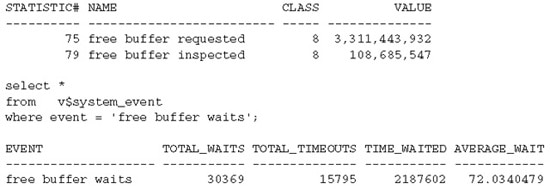The free buffer waits event has three parameters: file#, block#, and set ID. In Oracle Database 10g, this wait event falls under the Configuration wait class. Keep the following key thoughts in mind when dealing with the free buffer waits event.
Before a block is read into the buffer cache, an Oracle process must find and get a free buffer for the block. Sessions wait on the free buffer waits event when they are unable to find a free buffer on the LRU list or when all buffer gets are suspended.
The DBWR process is responsible for making clean buffers on the LRU lists.
Common Causes, Diagnosis, and Actions
A foreground process needing a free buffer scans the LRU list up to a predetermined threshold, usually a percentage of the LRU list. In Oracle9i Database, the threshold is 40 percent. This value is described in the X$KVIT (kernel performance information transitory instance parameters) view as “Max percentage of LRU list foreground can scan for free.” If a free buffer is not found when the threshold is met, the foreground process posts the DBWR process to make available clean buffers. While the DBWR process is at work, the Oracle session waits on the free buffer waits event.
Oracle keeps a count of every free buffer request. The statistic name in the V$SYSSTAT view is free buffer requested. Oracle also keeps a count of every free buffer request that fails. This is given by the TOTAL_WAITS statistic of the free buffer waits event. Free buffer requests are technically buffer gets, if you will, and free buffer requests that fail can be considered as buffer misses. Yet another V$SYSSTAT statistic free buffer inspected tells you how many buffers Oracle processes have to look at to get the requested free buffers. If the free buffer inspected value is significantly higher than the free buffer requested, that means processes are scanning further up the LRU list to get a usable buffer. The following queries list the systemwide free buffer requested, free buffer inspected, and free buffer waits statistics:
![]()

If a session spends a lot of time on the free buffer waits event, it is usually due to one or a combination of the following five reasons:
- Inefficient SQL statements
- Not enough DBWR processes
- Slow I/O subsystem
- Delayed block cleanouts
- Small buffer cache
Leave a Reply